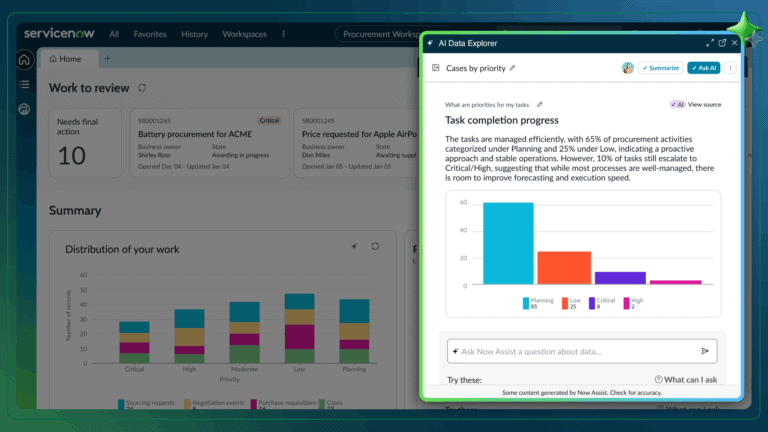ServiceNow has announced AI Experience, a new user interface that fully integrates AI into the platform. AI Experience provides a multimodal interface that enables employees to interact with various AI agents within their workflows through voice, text, and images. The platform integrates data, AI, and workflows into a single platform.
AI Experience is an extension of the existing Now Assist, aiming to offer a completely new AI experience that extends beyond the ServiceNow platform. The platform places AI at the center of the user experience, rather than treating AI as an optional add-on. According to ServiceNow, this will fundamentally change how people work with the ServiceNow platform.
AI-native approach to business processes
Employees will work with AI as standard within ServiceNow, as it becomes part of all actions and workflows. The interface operates in various ways; users can request information via voice, enter text commands, or upload images for analysis. This flexibility should improve the acceptance of AI tools within organizations.
Integration with existing ServiceNow ecosystem
AI Experience builds on the Now platform, which is becoming increasingly AI-driven. The solution integrates with ServiceNow’s existing workflow automation and data models. This means that organizations do not have to start their processes from scratch.
Additionally, AI Experience integrates with the ServiceNow Data Cloud through the Workflow Data Fabric. This architecture ensures that AI agents have access to all relevant business data, including from external systems such as Snowflake and BigQuery.
Governance and security remain central
An essential part of AI Experience is the AI Control Tower. This feature monitors all AI activities within the organization. According to ServiceNow, this allows companies to implement AI without losing control over security or compliance.
The Atlas Reasoning Engine monitors every step taken by AI agents and intervenes when results deviate from expectations. This approach is designed to prevent hallucinations and incorrect actions.
Build Agents accelerate app development
In addition to operational AI agents, ServiceNow is also introducing Build Agents for developers. Build Agents enable the development of complete applications or the extension of existing apps using natural language, eliminating the need for traditional coding.
Build Agents are integrated into ServiceNow Studio and can generate data models, workflows, and user interfaces based on prompts. This significantly lowers the threshold for app development. Employees without programming experience can thus build customized solutions that fit specific business processes more quickly.
The tool aligns seamlessly with ServiceNow’s existing low-code/no-code offerings. Additionally, ServiceNow offers complete freedom in the AI models you want to use. ServiceNow collaborates with various AI providers, including Anthropic, Google Gemini, Microsoft Azure, OpenAI, and its own ServiceNow models.
ServiceNow wants to do more with CRM
ServiceNow is also integrating AI Experience into its CRM solutions. This aligns with its ambition to compete with Salesforce with AI-driven customer processes. Sales and service teams can now perform complex tasks through natural conversations.
A new Configure, Price, Quote feature automates quotation processes. AI agents analyze customer needs and generate appropriate proposals without manual intervention. For sales teams, this means more time for customer relationships instead of administrative tasks. ServiceNow once again emphasizes its CRM ambitions in its presentations. It is clear that it is seeking to compete with Salesforce and wants a piece of that pie.
Implementation requires a strategic approach
Although AI Experience appears promising, success ultimately depends on its effective implementation. Organizations need to analyze their current processes and determine where AI will have the greatest impact. ServiceNow offers various tools for this, but it does require insight into the organization’s own business operations.
Integration with external systems remains a key area of focus. Not all organizations have a modern data architecture that connects seamlessly with ServiceNow’s platform. This can slow down implementation or require additional investment.
ServiceNow aims for complete AI peace of mind
During a ServiceNow presentation attended by Techzine, the company demonstrated how AI agents can significantly reduce the burden on employees. Integration with third-party AI agents is essential here. An example was shown in which a ServiceNow agent works with an Azure infrastructure agent to resolve a malfunction.
In theory, agents can work well together, especially if they use the MCP or A2A protocol. However, it will be some time before organizations can properly integrate virtually all their IT systems. ServiceNow believes it can partially solve this with special AI Web Agents that can automatically navigate websites and systems. For example, they are even capable of performing or reversing a firmware upgrade.
The AI Experience is expected to be available to all ServiceNow customers by the end of the year. It will then quickly become clear whether ServiceNow succeeds in completely unburdening customers with AI.
